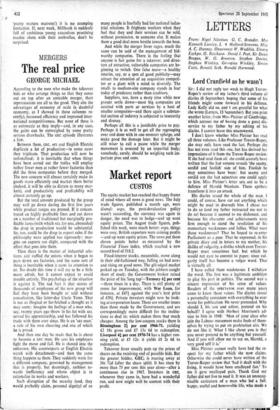The real price
MERGERS GEORGE MICHAEL
According to the men who make the takeover bids or who arrange things so that they come out on top after an amicable merger, their repercussions are all to the good. They cite the advantages of economy of scale (a doubtful economy, as I showed in these columns re- cently), increased efficiency and improved inter- national competitiveness. But none of these is as automatic as they imply—and, in any case, the gains can be outweighed by some pretty serious drawbacks. The GEC episode illustrates a few.
Between them, GEC, AEI and English Electric duplicate a lot of production—in some cases they triplicate. That production will now be rationalised: it is inevitable that when things have been sorted out the troika will employ rather fewer men at rather fewer factories than did the three companies before they merged. The new concern will almost certainly make its goods more efficiently and market them better (indeed, it will be able to dictate to many mar- kets), and productivity and profitability will almost certainly go up.
But the total amount produced by the group may well go down during the first few years while product ranges are pruned. If it concen- trated on highly profitable lines and cut down on a number of traditional but marginally pro- fitable items (with which AEI, for one, abounded) the drop in production would be substantial. So, too, could be the drop in export sales if the philosophy were applied too rigorously : mar- gins on exports are slight, compared with the effort that goes into them.
Then there is the matter of industrial rela- tions. GEC ruffled the unions when it began to pare down Am factories, and the same sort of thing is inevitable when it turns its attention to EE. No doubt this time it will try to be a little more adroit, but it cannot expect to avoid trouble entirely. The psychology of the situation is against it. The sad fact is that scores of thousands of employees of the new group will feel they have been bought or sold without consultation, like latter-day Uncle Toms. That is not as illogical or far-fetched a thought as it may seem: imagine the feelings of a man who, say, twenty years ago threw in his lot with AEI. served his apprenticeship, and has followed his trade with them ever since. He is an 'AEI man,' a role of his own choosing and one of which he is proud.
And then one day he reads that he is about to become a GEC man. He sees his employers fight the move and fail. He is shoved into the unknown. His counterparts at English Electric watch with detachment—and then the same thing happens to them. They suddenly work for a different company, governed by management that is properly, but dauntingly, ruthless to- wards inefficiency and whose object is to rationalise its works and workers.
Such disruption of the security (and, they would probably claim, personal dignity) of so many people is fearfully bad for national indus- trial relations. It frightens workers when they feel that they and their services can be sold, without permission, to someone else. It makes them a good deal more hostile towards the boss.
And while the merger fever rages, much the same can be said of the management of bid- worthy companies. There is the feeling that anyone is fair game for a takeover, and direc- tors of attractive, vulnerable companies are be- ginning to twitch. One false move—a healthy interim, say, or a spot of good publicity—may attract the attention of an acquisitive competi- tor or a giant with a mind to diversify. The small- to medium-size company stands in fear today of predators rather than creditors.
Suppliers, too, have a nasty time while new groups settle down—most big companies are assisted with parts or services by a host of smaller companies—and there again a substan- tial section of industry is subjected to insecurity and dismay.
Perhaps all this is a justifiable price to pay. Perhaps it is as well to get all the regrouping over and done with in one monster splurge, and make good the damage later. But it might be still wiser to call a pause while the merger movement is assessed by an impartial body; somebody, surely, should be weighing such im- portant pros and cons.










































 Previous page
Previous page